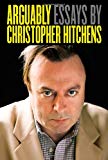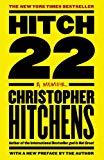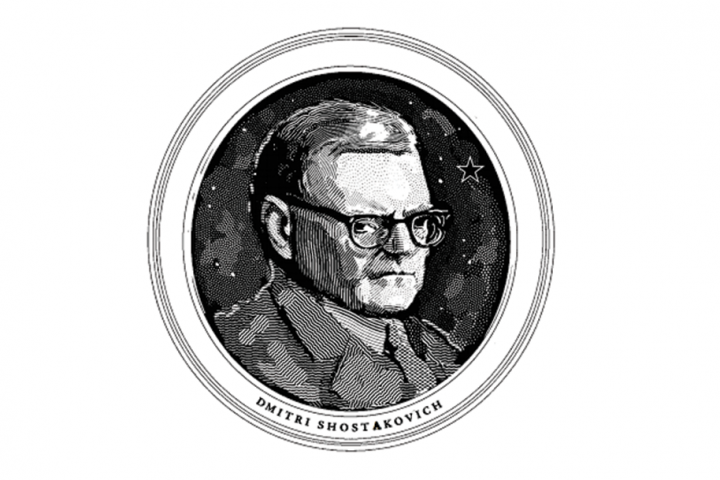Books Reviewed
A review of Arguably: Essays by Christopher Hitchens , by Christopher Hitchens
, by Christopher Hitchens
and Hitch-22: A Memoir , by Christopher Hitchens
, by Christopher Hitchens
On either side of the Atlantic, pick up a publication with cultural and political aspirations and you have been likely these many years to find that Christopher Hitchens was a contributor, advertised on the cover in bold type. In his memoir, Hitch-22, he thanks some 40 editors and publishers by name for publishing his work. This may well be a Grub Street record. The editorial pack mustered because under the pressure of world events Hitchens had switched from the hard Left to the neoconservative Right. In Cold War days, defection of the kind was sensational, and some aftermath of that survives. Writing the swashbuckling prose that is his personal signature, and plainly a man in the grip of his convictions, Hitchens made sure to be present and on parade in the daily battles of public opinion.
What energized him from the beginning is the sense that the order of things was changing, an epoch was coming to an end, and he had to discover what part to play. Nineteen forty-nine was an uncertain moment in which to be born English. Victory over Nazism, it was slowly sinking in, had come at great cost, bringing doubt about what was to happen next. A Hitchens polemic in 1990 with the title Blood, Class, and Nostalgia represents Britain and its empire sunk in failure and bankruptcy, and castigates the United States for taking this whole enterprise into receivership, as he puts it.
Another of his earlier books provides a short list of what he intended to expose and explode: "the celebrity culture and the spin-scum and the crooked lawyers and pseudo-statesmen and clerics." You do not really have to be on the Left to echo Amen, but it helps to believe the standard contemporary nostrums that protest is always rational and change always beneficial.
A good many political structures reflect the power of the wicked and the cruel, and politicians who go along with the world as it is qualify as pseudo-statesmen. Richard Nixon "had staged something very like a coup." Bill Clinton has "a base, hungry cunning." Hillary Clinton "almost single-handedly destroyed a coalition on national health care that had taken a quarter of a century to build and mature." Time and again, Hitchens portrayed Henry Kissinger with an animus more appropriate to Lavrenti Beria and Al Capone. Even minor figures must submit to the full scorn: "Prince Charles' empty sails are so rigged as to be swelled by any passing waft or breeze of crankiness and cant."
God, invariably with lower case spelling, emerges from the Hitchens imagination as a sort of miscreant cleric. Religions one and all persecute and make war on those of other faiths because they are caught in superstitions that negate any civilizing effect they might have had. Human beings are therefore mere mammals, by definition not in the image of a Creator. Mother Teresa is the subject of one of Hitchens's angrier demolition jobs. A nun widely admired as saintly for her work among the poor in India, she had won the Nobel Peace prize. Whether innocently or not, she undoubtedly associated with crooked politicians and con men, thus combining celebrity culture and spin-scum. For Hitchens she was compromised: "a demagogue, an obscurantist and a servant of earthly powers."
* * *
Arguably, all 800 pages of it, is his third collection of occasional pieces. These were all written in the last ten years when the anger quotient seems to have been fading and the call of the editors has become the driving force. It seems out of character to be reading encomiums to historic figures who don't need it, like Lincoln, Mark Twain, Edmund Burke, or Dr. Johnson. Some phrases have the detonating effect familiar from past performance, and "the Kennedy racket" is one such, but the direction of attack has otherwise veered almost completely. The Castro era, for example, winds down to a "highly commercial dictatorship" while Hugo Chavez is mocked as "very close to the climactic moment when he will announce that he is a poached egg and that he requires a very large piece of buttered toast so that he can lie down and take a soothing nap." Or again, the effusion of John Mearsheimer and Stephen Walt against Israel and Jews is "redeemed from complete dullness and mediocrity only by being slightly but unmistakably smelly."
One essay tries to put straight an encounter with Saul Bellow that went wrong and was widely gossiped about at the time, while another is an account of a much-reported incident in a Beirut street when Hitchens defaced a poster advertising Syrian fascists and was then physically assaulted by them for doing so. He's experienced Vietnam, Iraq, and North Korea, the latter aptly qualifying as "A Nation of Racist Dwarves." A friend he admires without reserve is the late English author and journalist (and one-time Communist Party activist) Jessica Mitford, which carries a risk of rebounding on him since her one great gift was for striking postures.
At a guess, over half these pieces are book reviews. He rates literature superior to religion as a source of ethics, but does not try to prove the point. Oddly conventional in his literary taste, and oddly British too, his method is to recount what he enjoys in such authors as Rebecca West, Arthur Koestler, Evelyn Waugh, Anthony Powell, W.H. Auden, and Philip Larkin. George Orwell is his patron saint and P.G. Wodehouse the court jester in constant attendance. Once again, he is in the habit of praising established people in no need of it.
* * *
Personal confession frees his memoir, Hitch-22, from journalistic point-scoring, and instead reveals the complex interplay between private and public that has shaped this child of his times. His father, known familiarly as the Commander, had been a naval officer in many actions during the war, including the epic engagement that sank the German battleship Scharnhorst. Hitchens recalls the declining naval bases where he spent his childhood, and laments how his father was retired against his will on a lesser pension than he deserved. Nonetheless the Commander held to a certain idea of England, conservative but not necessarily reactionary. Socialism was the doctrine of that moment but he thought it was founded on sand. His father and other veterans, Hitchens recognizes with a spasm of pity, were "brave and modest and honest and unassuming" just when these hallmark British virtues were no longer fit for purpose.
Towards the end of the war the Commander married Yvonne, twelve years younger, and a very different character. She seems to have been determined that the family should rise up the social scale. One day the young Christopher overheard her saying that if there was going to be an upper class in the country then her son was going to be in it. She was to buy him a black-tie dinner jacket for "high-toned events" in which she hoped he would star.
Yvonne's social anxiety had a tragic dimension. She was Jewish but hid this identity from her family. At the time of the 1973 Yom Kippur War, she decided without any warning to run away with a lover and settle in Israel. Hitchens was 24 on another fateful day when he heard that his mother had been murdered in Athens on the way to Israel. It turned out that she and her lover had in reality died in a suicide pact. Hitchens found himself consulting Durkheim, Cesare Pavese, Sylvia Plath, and anyone else with possible insights into self-destruction. The literature on the subject did nothing to alleviate the tragedy or give any moral guidance. Later still, and more or less accidentally, he learnt the secret of his mother's Jewishness. He was to search for family origins in Eastern Europe and Israel. His identity had unexpectedly shifted. "I do qualify as a member of the tribe," he wrote, although he was hesitant about the loyalties this might imply.
Educated at fee-paying schools as Yvonne would have wanted, Hitchens seems to have been spared the miseries recorded by so many English writers put through this mill. Able to read the longer words and the harder books, he learnt that language is the magic key. One master, a reactionary historian as it happens, presented him with a copy of The Communist Manifesto, intending to inoculate him against Marxism. Instead Hitchens was soon protesting about Cuba and Vietnam, and going on "Ban the Bomb" marches. A young member of the middle class like himself, he said with an unmistakable snigger, often has a huge moment of truth when he gets his first real kick from a cop. Rationalist that he claimed to be, he was one of so many living the 20th-century fantasy that individual fulfillment is to be found in the crowd.
Edward Gibbon left an unforgettable picture of the Oxford academics of his day swilling port in "dull and deep potations." At the end of the '60s Hitchens went up to an Oxford that had its up-to-date corruption. (I speak from experience, having just preceded him there.) The university was then a fine-tuned mechanism for taking in young men and women with largely unformed minds, and after three years discharging them cloned by the thousand for socialism, often a synonym for Communism. Indoctrination was another dull and deep potation. Many a college tutor preached Marxism, returning from a visit to the Soviet Union with news of its glorious economy and wonderful industrialization. Better Red than Dead, the slogan then in vogue, signaled accommodation, conscious or unconscious, to the incorporation of Western Europe into the Soviet bloc.
Balliol has an elitist reputation among Oxford colleges. (Presumably Hitchens had a scholarship there though I don't find mention of this in his memoir.) Its Master then was Christopher Hill, a historian much respected in spite of, or more probably because of, his political record. A Communist who had lived in Moscow in 1935, and author of abject apologies for Lenin and Stalin, Hill had worked his way early in the war to become head of the Russian desk of the Foreign Office. He is widely suspected of having been a Kim Philby-type Soviet agent. Fellow-travelling infection spread from the university into the town. Attending protest meetings, Hitchens met a man who instructed him in the evils of capitalism, and hey presto, he blossomed on the spot into a Marxist of the "Left Opposition," that is to say a Trotskyite or self-declared "Internationalist," to use the absurdly misleading term for several tiny sects divided by ideological disputes too claustrophobic and fierce to be reconciled even among themselves.
"I had hoped to re-make myself into a serious person and an ally of the working class," Hitchens explains; or in another of the grand old clichés, he felt intoxicated to be "yoked to the great steam engine of history." Yet some Oxford personalities did not fit the left-wing ethos and might be helpful to anyone making a career. Among those whom Hitchens made sure to cultivate were Sir Isaiah Berlin, the eminent historian of ideas, and John Sparrow, the warden of All Souls College, an institution that uniquely combines scholarship and privilege. Sparrow was an implacable upholder of the Right, a homosexual who took Hitchens into his openly reactionary circle. Showing him photographs of young men, in all likelihood Sparrow was making a pass in his notoriously convoluted way. Hitchens caused a minor sensation by claiming in this book to have slept with two unidentified undergraduates who later became members of Mrs. Thatcher's government.
* * *
Here was a youthful master of the double standards that so often characterize the Left. Hitchens's political beliefs and activities had no correspondence to the zeal of his social self-promotion. Several times he maintained that a writer has to be alert to irony. It is ironical that he should have become a Marxist and a Trotskyite when the political and moral bankruptcy of these prescriptions was obvious. An epoch was indeed coming to an end, and he was aligning himself with a part of it that was both inhuman and obsolete. Those subjected to the Oxford mechanism for mass-producing socialists soon realized that they had been victims of a willful experiment; the intellectual climate changed accordingly; and in a fine display of irony they were to vote en bloc for Mrs. Thatcher. Hitchens took his time to abandon the double standards he had adopted. To some extent this delay was due to what has to be called hero-worship of select contemporaries, a small mutual admiration society whose members were determined to rush the literary heights all together. Salman Rushdie was one such. Another was Martin Amis, the novelist who had to reach middle age before he got the measure of Stalin and Communism, and yet another was the poet James Fenton, a keen admirer of the Khmer Rouge. Hitch-22 is dedicated to him.
To choose friends is also to choose enemies. There were fascists to see off in Portugal, Stalinists to see off in Poland. During the crisis over Rhodesia, Hitchens met Mrs. Thatcher and they had a contretemps that ended with her smacking him on the bottom with a rolled-up parliamentary order paper, and as usual getting in the last word, "Naughty boy." When Argentina invaded the Falkland Islands, another military dictator had to be seen off, and suddenly Hitchens was on the same side as Thatcher. The Iranian revolution of 1979 led to a yet more demanding test. Edward Said, one of Hitchens's closest friends, had welcomed Ayatollah Khomeini's defiance of the United States as long overdue. Hitchens quickly campaigned on behalf of Salman Rushdie's allegedly blasphemous novel The Satanic Verses and against Khomeini's murderous fatwa in response. The ensuing cause célèbre on the issue of free speech really established him as a public intellectual. In a vivid image, Khomeini is still a "black-winged ghoul," and his Iran, and by extension Islamism, are monstrous assaults on civilization.
In the 1980s Hitchens began to live in the United States. Opportunity called. The order of things might be changing for the better. In the safe, enjoyable haven of New York he could rip into the pseudo-statesmen he loved to hate, and be sure to be applauded for it. The telltale label "my good friend" attaches all too smoothly to the like-minded Norman Mailer, Gore Vidal, Susan Sontag, and countless other experts at undermining the privileges on which in fact they have depended for their careers. It is another encompassing irony that he blamed the United States for having taken Britain into receivership only to become an outstanding beneficiary of that receivership.
Hitchens had said of himself that he lacked the courage to be a real soldier or a real dissident. But he had enough courage to pass moral judgments certain to leave him ostracized by the comrades. Now there were Stalinists to see off in North Korea; Milosevic and Serb nationalists to see off in Bosnia; Osama bin Laden and jihadists to see off all over the world. Granted that Noam Chomsky, "my then-friend," is certain to be apologizing for anything and everything anti-American, it was only natural to see him off too. Martin Amis's late discovery of the evils of Communism Hitchens found painfully naïve. Edward Said merits a whole chapter to himself (as well as an essay in Arguably). First presented as admirable, Said was prone to laughter, a mimic, ready with literary allusions, and always very well dressed with tweeds and cravats. He was uniquely placed to explain to the Palestinians that violence was certain to be more damaging to them than to the Israelis. Urging them instead into intifada and armed struggle, he played an important part in subjecting Palestinians to their own tyrannical leaders. Corruptio optimi pessima. Said finally exposed himself as a petty street-brawler when he described something Hitchens had written as racist.
* * *
After the al-Qaeda onslaught against the United States, Saddam Hussein had to be seen off. But the Left condemns intervention in the Middle East, in effect aligning with Islamism and tyranny, preferring to defend the indefensible at the expense of freedom and patriotism. To Hitchens this was "overbred and gutless" (the first of these adjectives is curious but I think intended to convey that privilege has made the Left incapable of understanding the nature of tyranny). He went on to say that after such a moral disaster he couldn't remain where he had been on the political spectrum. Trotskyism he now abuses with fury as "purulent."
The scourge of the pseudo-statesmen thus ended up on their side in today's great issues. He dropped into his memoir a little old-style sneering, just to show he still could, calling Jimmy Carter a "pious born-again creep," or finding both Bill Clinton and Kissinger as "loathsome" as ever. This role that he invented as a pro-government dissident set up an unprecedented and interesting double standard for him to live by. The irony of it is marvelous. Lately he let it be known that he was gravely ill with inoperable cancer, whereupon The Times of London devoted an editorial to praising him and wishing him well. So the establishment embraced a recruit very unlike others. His death at the age of 62 is sad and premature but he had already become the star that his mother hoped he would be, and a phenomenon in his own right.





